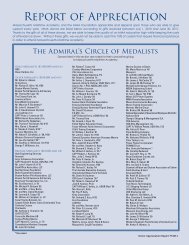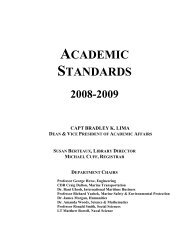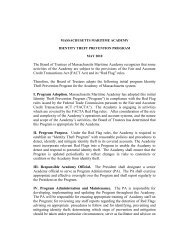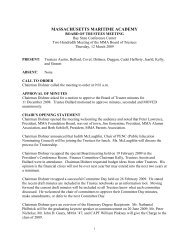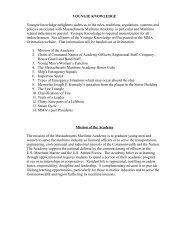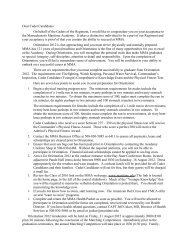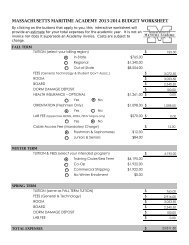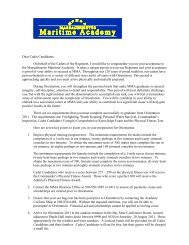College Students With Disabilities - Massachusetts Maritime Academy
College Students With Disabilities - Massachusetts Maritime Academy
College Students With Disabilities - Massachusetts Maritime Academy
Create successful ePaper yourself
Turn your PDF publications into a flip-book with our unique Google optimized e-Paper software.
The Law<br />
American with <strong>Disabilities</strong> Act<br />
The ADA prohibits discrimination on the basis of disability in employment, State and local government, public<br />
accommodations, commercial facilities, transportation and telecommunications.<br />
To be protected by the ADA, one must have a disability or have a relationship or association with an individual<br />
with a disability. An individual with a disability is defined by the ADA as a person who has a physical or<br />
mental impairment that substantially limits one of ore major life activities, a person who has a history or record<br />
of such an impairment, or a person who is perceived by others as having such an impairment. The ADA does<br />
not specifically name all of the impairments that are covered.<br />
Americans with <strong>Disabilities</strong> Act: Title II<br />
Subject to the provisions of this subchapter, no qualified individual with a disability shall, by reason of such<br />
disability, be excluded from participation in or be denied the benefits of the services, programs, or activities of a<br />
public entity, or be subjected to discrimination by any such entity.<br />
Rehabilitation Act of 1973: Section 504<br />
No otherwise qualified individual with a disability in the United States shall, solely by reason of her or his<br />
disability, be excluded from the participation in, be denied the benefits of, or be subjected to discrimination<br />
under any program or activity receiving Federal financial assistance. For the purposes of this section, the term<br />
"program or activity" means all of the operations of - (2)(A) a college, university, or other post-secondary<br />
institution, or a public system of higher education.<br />
Americans with <strong>Disabilities</strong> Act: Amendments Act<br />
The ADA Amendments Act of 2008 (Public Law 110-325, ADAAA) became effective January 1, 2009. The<br />
ADAAA expands interpretation of the ADA's coverage, which has been narrowly construed by case law in a<br />
number of decisions by the Supreme Court. Because Congress viewed those decisions as limiting the rights of<br />
persons with disabilities, the ADAAA explicitly reversed those decisions. It also rejected portions of the<br />
regulations published by the Equal Employment Opportunity Commission (EEOC) that interpret Title I (the<br />
employment-related title) of the ADA. The ADAAA makes changes to the definition of the term "disability,"<br />
clarifying and broadening that definition -- and therefore the number and types of persons who are protected<br />
under the ADA and other Federal disability nondiscrimination laws.<br />
The ADAAA requires that courts interpreting the ADA focus on whether the covered entity has discriminated,<br />
rather than whether the individual seeking the law's protection has an impairment that fits within the technical<br />
definition of the term "disability." The Act retains the ADA's basic definition of "disability" as: 1. an<br />
impairment that substantially limits one or more major life activities; 2. a record of such an impairment; or 3.<br />
being regarded as having such an impairment. However, it changes the way that the statutory terms should be<br />
interpreted.<br />
6



